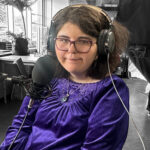January 27, 2026
MYTH: Nonverbal or Nonspeaking People with Autism are Intellectually Disabled
FEATURED POSTS
December 30, 2025
December 15, 2025
November 25, 2025
RONIT MOLKO, PH.D., BCBA-D
STRATEGIC ADVISOR, LEARN BEHAVIORAL
Just because someone is nonspeaking, does not mean they’re non-thinking. Around 25 to 30 percent of children with autism spectrum disorder are minimally verbal or do not speak at all. These individuals are referred to as nonverbal or nonspeaking, but even the term nonverbal is a bit of a misnomer. While nonspeaking individuals with autism may not speak words to communicate, many still understand words and even use written words to communicate.
Nonspeaking individuals with autism utilize a variety of augmentative and alternative communication (AAC) methods. These range from no-tech and low-tech options such as gestures, writing, drawing, spelling words, and pointing to photos or written words, to high-tech options like iPads or speech-generating devices.
There are several reasons that an individual with autism may have difficulty talking or holding conversation that are not related to intellectual disability. The disorder may have prevented the normal development of verbal communication skills. They may also have conditions such as apraxia of speech, which affects specific brain pathways, making it difficult for a person to actually formulate and speak the words they’re intending to say. Some may also have echolalia, which causes a person to repeat words over and over again.
While these conditions prevent many individuals from speaking, it does not mean they cannot learn, understand, or even communicate. There is a pervasive misunderstanding about this among the general population due to a lack of education. It is often wrongly assumed that anyone who has difficulty speaking is intellectually disabled.
This misconception can be particularly harmful when held by medical professionals. In the 1980s, as many as 69 percent of people with an autism diagnosis had a dual diagnosis of mental retardation, which would now be labeled intellectual disability. By 2014, that number had declined to just 30 percent, as researchers improved the diagnostic criteria for autism and a fuller picture of the disorder emerged.
Researchers are still working to try and improve diagnostics and better distinguish nonspeaking autism from intellectual disabilities. As Audrey Thurm, a child clinical psychologist at the National Institute of Mental Health in Bethesda, Maryland says: “We have to figure out who has only autism, who has only intellectual disability and, importantly, who has both intellectual disability and autism. That’s millions of people who could be better served by having an accurate distinction that would put them in the right group and get them the right services.”
It’s important to challenge the perception that those who do not speak cannot think. Not only do we risk failing to give them the proper supports and services, but we also undermine their individuality, ingenuity, creativity, and humanity by failing to see them as they truly are. Just because they are not talking does not mean they do not have much to tell us.







